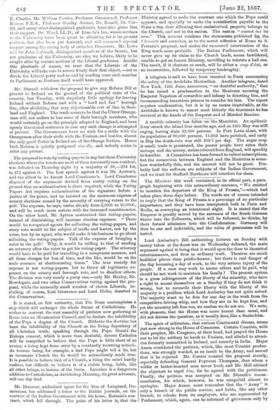The proposal to vote by voting-papers in any but those
University elections where the voters are most of them necessarilynon-resident, was defeated on Thursday night by a majority of 38,-234 for, to 272 against it. The best speech against it was Mr. Ayrton's, and the ablest in its favour Lord Cranborne's. Lord Cranborne disposed of the argument derived from vestry voting on the ground that no authentication is there required, while the Voting Papers Act requires authentication of the signature before a justice of the peace, and he insisted on the enormous expense of county elections caused by the necessity of carrying voters to the poll. The expense, he says, varies already from 3,0001. to 10,0001., and will be much more serious with the increased constituencies. Ou the other hand, Mr. Ayrton maintained that voting-papers, instead of diminishing, will increase election expenses. " There would be recognized agents for collecting the voting-papers, and every vote would be the subject of traffic and barter, not by the voter, but by an agent, who would make it his business to go about collecting the voting-papers. Talk of the expense of bringing a voter to the poll ! Why, it would be trifling to that of sending an attorney after the voter to get his voting-paper. The attorney would have to be paid for travelling in a sumptuous manner, and all these charges for loss of time, and the like, would be on the scale common at electioneering times." The true remedy for expense is not voting-papers, but to throw all legitimate ex- penses on the county and borough rate, and to disallow others. The division was very nearly a party one,—only Mr. Henley, Mr. Newdegate, and two other Conservatives voting against the pro- posal, while the unusually small number of eleven Liberals, in- cluding, of course, Earl Grosvenor and Lord Elcho, deserted to the Conservatives.






























 Previous page
Previous page